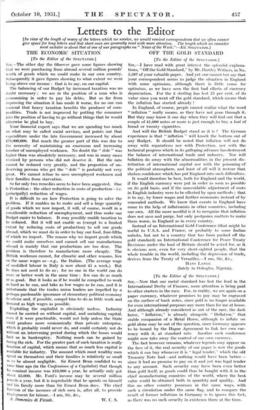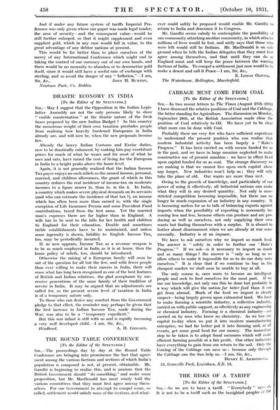[To the Editor of the SPECTATOR.]
Sta,—Now that our metal standard has lost the lead in the International Derby of Finance, more attention is being paid to other starters in the race. For, in reality, we are again on a paper currency, whatever promises to pay may be engraved on the surface of bank notes, since gold is no longer available for even international purposes any more than for use at home. And although already considered as out of the race, the dark horse, "Inflation," is already alongside " Deflation," that stable companion of a Metal Horse, although to inflate on gold alone may be out of the question, since Germany appears to be bound by the Hague Agreement to link her own cur- rency with it, at standard rate. Another such conference might now take away the control of our own currency.
The fact however remains, whatever legends may appear on the face of it, the real security of our paper is now the goods which it can buy whenever it is legal tender," which the old Treasury Note had—and nothing would have been better— since it had no promise to pay on it and yet was legal tender to any amount. Such security may have been even better than gold itself, as goods could thus be bought with it in the chief manufacturing countries of the world, where the best value could be obtained both in quantity and quality. And this no other country possesses in the same ways, with such a circulation under the same flag, and to compare the result of former inflations in Germany is to ignore this fact, as there was no such security in existence there at the time.
And if under any future system of tariffs Imperial Pre- ference was only given where our paper was made legal tender, the area of security—and the consequent value—would be still further enlarged, so that it might supplement and even supplant gold, which in any case would fall in value, to the great advantage of any debtor nations at present.
This would be far better than to place ourselves at the mercy of any International Conference which might end in taking the control of our currency out of our own hands, and there would be no necessity to abandon or to demonetize gold itself, since it would still have a useful rate of exchange with sterling, and so avoid the danger of any " Inflation."—I am,



















































 Previous page
Previous page